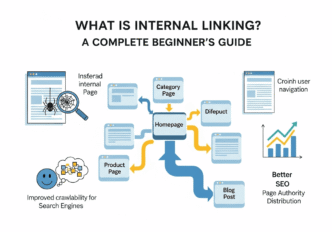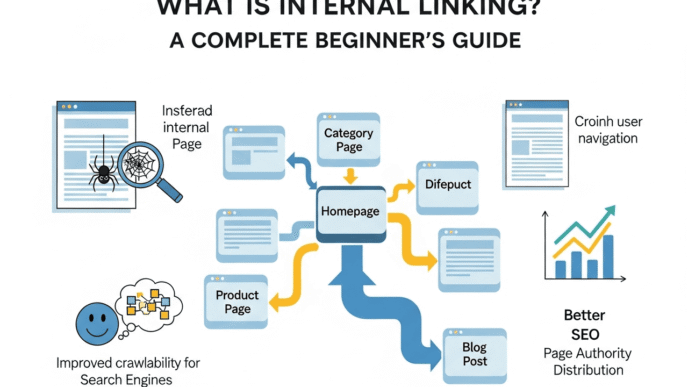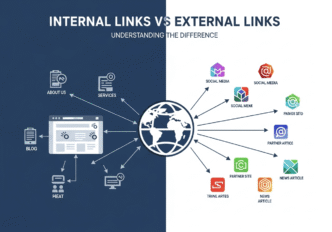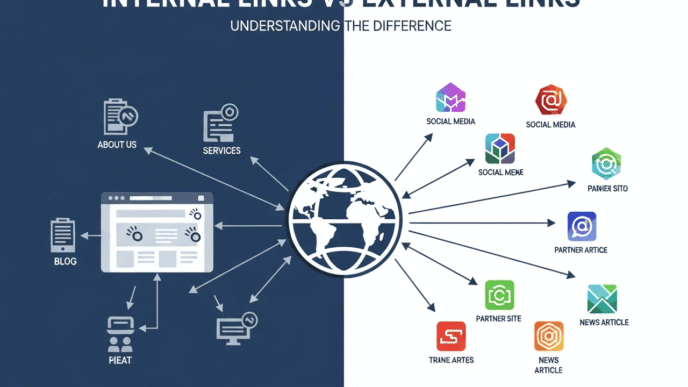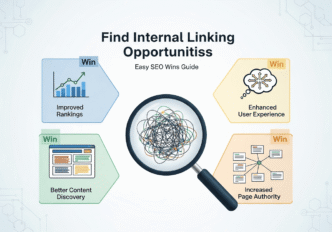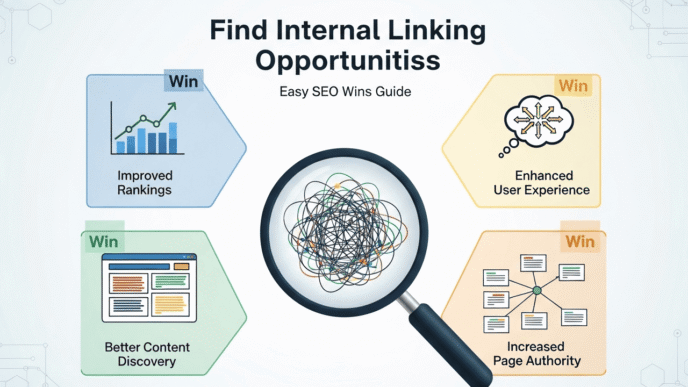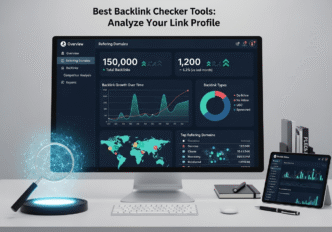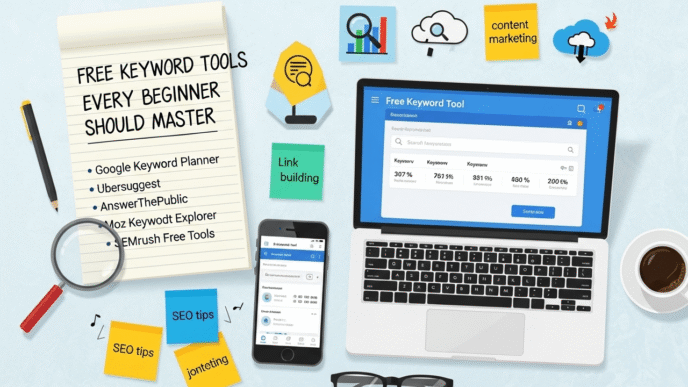Ever felt like you’re hunting for unicorns when trying to pick the right keywords? You spend hours researching, only to target terms that either nobody searches for or that are impossible to rank for. It’s like showing up to a gold rush with a plastic spoon while everyone else has mining equipment.
Here’s the truth: keyword research for beginners doesn’t have to be a guessing game that leaves you frustrated and overwhelmed. Most newcomers make the mistake of chasing shiny objects (high-volume keywords) instead of finding the real treasure – keywords that actually bring qualified traffic and conversions.
The secret sauce? Learning to think like your customers instead of thinking like a search engine. When you master beginner keyword research, you’re not just finding words – you’re discovering the exact language your future customers use when they’re desperately seeking what you offer.
Ready to strike keyword gold without breaking the bank or your sanity? Let’s turn you from keyword prospector into keyword millionaire.
Table of Contents
Toggle
What Makes Keyword Research for Beginners Different from Pro Strategies?
Keyword research for beginners isn’t just a simplified version of advanced techniques – it’s a completely different approach. While SEO veterans can compete for brutal keywords, beginners need to be smarter, not harder.
Think of it like fishing. Pros can use expensive equipment to catch big fish in competitive waters. Beginner keyword research is about finding the perfect fishing spot where the fish are biting and the competition is sleeping.
The Beginner’s Advantage
Why starting small is actually genius:
- Lower competition means faster results
- Less money needed for content and promotion
- Quicker validation of what works
- Building authority step by step
- Learning without massive risk
The mindset shift you need: Instead of “How can I rank for ‘digital marketing’?” ask “What specific problem am I solving and how would someone search for that solution?”
Pro Tip: The biggest mistake beginners make is trying to compete with established websites immediately. Start with keywords you can actually rank for, then work your way up the authority ladder.
Why Do Most SEO Keyword Basics Tutorials Fail Beginners?
Most SEO keyword basics guides treat beginners like miniature SEO experts. They throw around terms like “keyword difficulty” and “search volume” without explaining what these numbers actually mean for someone starting out.
Here’s what usually happens: You follow a tutorial, find some keywords, create content, and… crickets. No traffic, no rankings, no results.
The Real Problems with Traditional Approaches
Information overload syndrome:
- Too many tools recommended at once
- Complex metrics without context
- Advanced strategies for beginner problems
- No clear prioritization framework
The “big keyword” trap:
- Targeting terms way above your authority level
- Ignoring long-tail opportunities
- Competing with established giants
- Measuring success by volume instead of results
Pro Tip: Focus on understanding one keyword research method deeply before adding complexity. Master the basics with free tools before investing in premium software.
How to Do Keyword Research for Beginners Step by Step?
How to do keyword research for beginners step by step starts with understanding your audience, not jumping into tools. The best keyword researchers are customer psychologists first, SEO technicians second.
Step 1: The Customer Conversation Method
Before touching any tools, have real conversations:
Talk to existing customers:
- “What did you search for before finding us?”
- “What words describe your main problem?”
- “How would you explain this to a friend?”
Analyze support tickets and emails:
- Common questions reveal search intent
- Customer language patterns
- Pain points and urgency indicators
Study competitor comments and reviews:
- What problems do people mention?
- How do they describe solutions?
- What language do they use naturally?
Step 2: The Brain Dump Exercise
Create your seed keyword list:
- Write down 20-30 ways people might describe your solution
- Include slang, technical terms, and beginner language
- Ask friends how they’d search for your service
- Don’t edit or judge – just capture everything
Categories to brainstorm:
- Problem-focused terms (“can’t sleep,” “website won’t load”)
- Solution-focused terms (“sleep aid,” “website hosting”)
- Alternative descriptions (“insomnia help,” “web hosting service”)
- Question-based searches (“why can’t I sleep,” “how to host a website”)
Step 3: The Free Tool Validation
Use Google’s free tools to validate ideas:
Google Autocomplete Method:
- Type your seed keywords into Google
- Note the suggested completions
- Try variations and related terms
- Document promising long-tail phrases
“People Also Ask” Mining:
- Search your main keywords
- Expand all “People Also Ask” questions
- Find question-based keyword opportunities
- Identify information gaps you can fill
Related Searches Exploration:
- Scroll to bottom of Google results
- Note “Related searches” suggestions
- Click through and repeat the process
- Build a comprehensive keyword map
Step 4: The Intent Classification System
Organize keywords by search intent:
| Intent Type | Example Keywords | Content Strategy |
|---|---|---|
| Informational | “how to sleep better” | Educational blog posts |
| Commercial | “best sleep aids 2025” | Comparison articles |
| Transactional | “buy melatonin online” | Product pages |
| Navigational | “Sleep Foundation website” | Brand-focused content |
Pro Tip: Start with informational keywords – they’re easier to rank for and help build topical authority before targeting competitive commercial terms.
What Are the Best Keyword Research Methods for New Websites?
Best keyword research methods for new websites focus on finding opportunities that established sites ignore. Think of it as digital real estate – new sites can’t afford prime locations, but they can find great neighborhoods before they become popular.
The Long-Tail Goldmine Strategy
Why long-tail keywords are beginner gold:
- Lower competition from big players
- Higher conversion rates due to specificity
- Easier to create targeted content
- Faster ranking potential
Long-tail keyword patterns that work:
- Location + service (“Denver web design”)
- Problem + solution (“fix broken WordPress site”)
- Product + modifier (“affordable email marketing”)
- How-to + specific outcome (“how to increase Instagram followers organically”)
The Question-Based Opportunity Method
Question keywords are beginner-friendly because:
- Clear search intent
- Natural content structure (FAQ format)
- Featured snippet opportunities
- Voice search optimization potential
Question research techniques:
- Use AnswerThePublic for visual question mapping
- Check Quora for real user questions
- Monitor Reddit discussions in your niche
- Analyze “People Also Ask” expansions
The Competitor Gap Analysis (Free Version)
Find opportunities competitors miss:
Manual competitor research:
- Identify 3-5 smaller competitors (not industry giants)
- Analyze their top-performing content
- Look for topics they cover superficially
- Find questions their content doesn’t answer
Content gap identification:
- Topics they mention but don’t explore deeply
- Related keywords they don’t target
- Different angles on the same topics
- Underserved audience segments
Case Study: A new fitness blog couldn’t compete for “weight loss tips” but found success with “weight loss tips for busy parents working from home” – a specific long-tail with clear intent and lower competition.
Which Keyword Research Tools Should Beginners Start With?
Keyword research tools for beginners should be simple, affordable (preferably free), and focused on actionable insights rather than overwhelming data dumps.
Free Tools Every Beginner Needs
| Tool | Best For | Key Features | Limitations |
|---|---|---|---|
| Google Keyword Planner | Search volume and competition basics | Official Google data, campaign planning | Broad volume ranges, AdWords focused |
| Google Autocomplete | Real user search patterns | Instant suggestions, no limits | No volume data, manual process |
| AnswerThePublic | Question-based keywords | Visual keyword mapping, question focus | Limited free searches per day |
| Ubersuggest (Free) | Comprehensive keyword ideas | Volume data, competition scores | Limited daily searches |
| Google Trends | Seasonal patterns and popularity | Trending topics, geographic data | Relative data only, not absolute |
Premium Tools Worth the Investment (Later)
When you’re ready to level up:
| Tool | Monthly Cost | Best Feature | When to Upgrade |
|---|---|---|---|
| Semrush | $119+ | Comprehensive competitor analysis | When you need detailed competitor insights |
| Ahrefs | $99+ | Backlink data and content gaps | When link building becomes priority |
| KWFinder | $29+ | Beginner-friendly interface | When you need more keyword suggestions |
| Surfer SEO | $59+ | Content optimization guidance | When you’re creating content regularly |
The Free Tool Workflow
Your daily keyword research routine:
Morning (15 minutes):
- Check Google Trends for trending topics in your niche
- Note any seasonal patterns or emerging interests
Research Session (30-45 minutes):
- Start with Google Autocomplete for seed keyword expansion
- Use AnswerThePublic for question-based opportunities
- Validate with Google Keyword Planner for volume estimates
Analysis (15 minutes):
- Categorize keywords by intent and difficulty
- Prioritize based on relevance and competition
- Add promising keywords to your content calendar
Pro Tip: Master free tools completely before investing in premium options. Many successful bloggers built their entire keyword strategies using only Google’s free tools.
How Can You Find Your First SEO Keywords That Actually Work?
How to find your first SEO keywords that drive results requires thinking beyond search volume. The best beginner keywords often have modest search volumes but crystal-clear commercial intent.
The “Customer Journey” Keyword Map
Map keywords to customer stages:
Awareness Stage (Informational Intent):
- Problem identification keywords
- “How to” and “What is” searches
- Symptom-based queries
- Educational content opportunities
Consideration Stage (Commercial Intent):
- Solution comparison keywords
- “Best” and “vs” searches
- Review and recommendation queries
- Buying guide opportunities
Decision Stage (Transactional Intent):
- Product-specific searches
- “Buy” and “price” keywords
- Local service searches
- Immediate action queries
The Local Opportunity Goldmine
Local keywords for service businesses:
- “[Service] + [City]” combinations
- “[Problem] + near me” searches
- Local modifier variations
- Neighborhood-specific terms
Example local keyword progression:
- Start: “plumber Denver” (high competition)
- Better: “emergency plumber Denver” (more specific)
- Best: “emergency plumber Highlands Denver” (neighborhood-specific)
The “Problems People Pay to Solve” Method
High-value keyword characteristics:
- Urgent problems needing immediate solutions
- Expensive problems worth paying to fix
- Recurring problems creating ongoing value
- Complex problems requiring expertise
Real example: Instead of targeting “social media marketing,” a beginner found success with “how to get customers from Facebook for small restaurants” – specific, urgent, and valuable.
Pro Tip: The best beginner keywords often sound boring to competitors but are exactly what your ideal customers search for when they’re ready to take action.
What’s the Complete Beginner Guide to Finding Profitable Keywords?
A beginner guide to finding profitable keywords focuses on revenue potential rather than just traffic volume. Profitable keywords are those that attract visitors who convert into customers, subscribers, or engaged readers.
The Profitability Assessment Framework
High-profit keyword indicators:
- Commercial intent language (“buy,” “hire,” “best”)
- Problem urgency signals (“emergency,” “fast,” “urgent”)
- Value-focused modifiers (“affordable,” “premium,” “professional”)
- Local intent for service businesses
Red flags for beginners:
- Informational keywords with no monetization path
- Extremely broad terms with unclear intent
- Keywords requiring massive content investments
- Terms dominated by major brands
The Content ROI Calculator
Before targeting any keyword, ask:
- Can I create better content than what’s currently ranking?
- Will traffic from this keyword likely convert?
- Do I have a clear monetization strategy?
- Can I realistically rank in the top 5 results?
Simple profitability scoring:
- Conversion potential: 1-5 scale
- Competition level: 1-5 scale (5 = easiest)
- Content creation difficulty: 1-5 scale (5 = easiest)
- Total score: Target keywords scoring 12+ first
Monetization-Aligned Keyword Strategy
Match keywords to revenue streams:
For affiliate marketing:
- Product review keywords
- Comparison and “vs” terms
- “Best [product] for [use case]”
- Buying guide keywords
For service businesses:
- Problem-solution keywords
- Local service terms
- “How to” keywords with service tie-ins
- Consultation and quote-related searches
For e-commerce:
- Product-specific searches
- Category browsing terms
- Price and deal-focused keywords
- Specification and feature searches
Case Study: A freelance web designer stopped targeting “web design tips” (informational, low conversion) and focused on “affordable web design for small businesses” (commercial intent, local angle). Result: 3x more consultation requests with half the traffic.
What Common Keyword Research Fundamentals Do Beginners Miss?
Keyword research fundamentals that beginners often overlook can make the difference between success and spinning your wheels for months without results.
Mistake #1: Ignoring Search Intent Reality
The problem: Targeting keywords without understanding what users actually want to find.
Example of intent mismatch:
- Keyword: “social media marketing”
- Beginner assumption: People want to hire services
- Reality: Most searchers want to learn how to do it themselves
- Better target: “social media marketing services for small business”
Mistake #2: The “Perfect Keyword” Obsession
Why this backfires:
- Endless research without content creation
- Analysis paralysis preventing action
- Missing obvious opportunities while seeking perfection
- Forgetting that content quality matters more than keyword perfection
The 80/20 rule for keywords:
- 80% of your results come from taking action on good keywords
- 20% comes from finding the “perfect” keyword
- Better to publish content targeting decent keywords than to endlessly research
Mistake #3: Competition Misunderstanding
Common beginner errors:
- Only looking at domain authority instead of page-level competition
- Assuming high competition means impossible to rank
- Not analyzing the actual content quality of competitors
- Ignoring niche-specific competition patterns
Mistake #4: Volume Vanity Metrics
Why search volume can mislead beginners:
- High volume often means high competition
- Volume doesn’t indicate conversion potential
- Seasonal fluctuations aren’t considered
- Local businesses need local volume, not global numbers
Pro Tip: A keyword with 500 monthly searches and clear commercial intent often delivers better ROI than a 5,000-volume informational keyword with no monetization path.
How Should Your Keyword Selection Process Actually Work?
Your keyword selection process should be systematic but not overwhelming. Think of it as building a keyword portfolio rather than betting everything on single terms.
The Beginner’s Keyword Portfolio Strategy
Portfolio allocation for new sites:
- 60% long-tail, low-competition keywords
- 25% medium-competition opportunities
- 15% aspirational keywords for future authority
Content calendar integration:
- Week 1: Long-tail informational content (easy wins)
- Week 2: Commercial intent keyword (conversion focus)
- Week 3: Supporting long-tail content (authority building)
- Week 4: Local or niche-specific opportunity
The Decision Framework
Keyword evaluation criteria:
Must-have factors:
- Clear search intent alignment with your goals
- Realistic ranking potential within 6 months
- Audience relevance to your business/niche
- Content creation feasibility
Nice-to-have factors:
- Decent search volume (100+ monthly searches)
- Growth trend rather than declining interest
- Multiple content angle possibilities
- Related keyword cluster potential
Implementation Priority System
Tier 1 (Immediate Action):
- Long-tail keywords with clear commercial intent
- Question-based keywords you can answer comprehensively
- Local keywords for location-based businesses
- Problem-focused terms with solution tie-ins
Tier 2 (Next Month):
- Medium-competition keywords with good potential
- Seasonal keywords approaching their peak season
- Competitor gap opportunities you’ve identified
- Content expansion keywords for existing posts
Tier 3 (Future Goals):
- High-competition aspirational keywords
- Broad terms requiring significant authority
- Expensive-to-create content keywords
- Link-building dependent opportunities
Pro Tip: Start with Tier 1 keywords exclusively. Only move to Tier 2 after you’ve seen success with easier targets. This builds confidence and authority simultaneously.
Advanced Keyword Analysis Techniques for Ambitious Beginners
Once you’ve mastered the basics, these keyword analysis techniques will help you find opportunities others miss while staying within beginner-friendly territory.
The “Alphabet Soup” Method
Systematic keyword expansion:
- Take your main keyword + A: “email marketing automation”
- Continue through the alphabet: “email marketing best practices”
- Use numbers: “email marketing 2025,” “5 email marketing tips”
- Try different word orders: “marketing email templates”
The Competitor Content Gap Analysis
Manual gap analysis process:
- List your top 5 competitors
- Identify their most popular content pieces
- Look for topics they cover superficially
- Find questions their content doesn’t fully answer
- Create comprehensive content filling those gaps
The Related Search Spiral
Deep keyword discovery:
- Search your main keyword
- Note “Related searches” at bottom
- Search each related term
- Note their related searches
- Continue for 3-4 levels deep
- Map connections between keyword families
The Forum and Community Mining
Real-world keyword discovery:
- Join relevant Facebook groups, Reddit communities
- Note the exact language people use for problems
- Identify recurring questions and complaints
- Look for slang and industry-specific terms
- Find pain points that aren’t well-addressed online
Pro Tip: Set aside 30 minutes weekly for community listening. The keyword insights you gain from real conversations often outperform any tool-based research.
Common Keyword Research Pitfalls Every Beginner Must Avoid
Even with the best intentions, beginners fall into predictable traps that waste time and sabotage results. Here are the most dangerous keyword research mistakes and how to sidestep them completely.
Pitfall #1: The “Perfect Keyword” Paralysis
The trap: Spending weeks researching without ever creating content, waiting for the “perfect” keyword that doesn’t exist.
Why it’s dangerous: According to Backlinko’s content performance <a href=”https://backlinko.com/content-study” target=”_blank” rel=”nofollow”>study</a>, 90.63% of pages get zero traffic from Google – often because they never get published while creators chase perfect keywords.
The fix:
- Set a research time limit (maximum 2 hours per content piece)
- Use the “good enough” principle – 70% confidence is enough to start
- Remember: You can always update and optimize after publishing
Pitfall #2: Volume Vanity Syndrome
The mistake: Choosing keywords solely based on high search volume numbers.
The reality: According to Ahrefs’ <a href=”https://ahrefs.com/blog/long-tail-keywords/” target=”_blank” rel=”nofollow”>analysis</a> of long-tail keywords, 96.55% of all keywords get fewer than 10 searches per month, yet these long-tail keywords often have the highest conversion rates.
Statistical insight: Keywords with 1,000+ monthly searches typically have 50-70% higher competition, while keywords with 100-500 searches often have 3x better conversion rates for beginners.
Pitfall #3: The Competition Misjudgment Error
Common mistake: Looking only at domain authority instead of actual page-level competition.
The surprise: A page from a high-authority site can rank poorly if the content quality is low, while a well-optimized page from a newer site can outrank established competitors with better content.
Smart competition analysis:
- Analyze the actual content quality of top 10 results
- Check if existing content fully answers the search query
- Look for content gaps you can fill more comprehensively
- Consider user experience factors like page speed and mobile optimization
Pitfall #4: Ignoring Search Intent Evolution
The problem: Targeting keywords without understanding that search intent can shift over time.
Real example: “Remote work” evolved from informational intent (2019) to commercial intent (2020-2021) to transactional intent (2022+) as the market matured.
The solution: Regularly review SERP changes for your target keywords and adapt content accordingly.
Pitfall #5: The Single-Keyword Tunnel Vision
The mistake: Creating content that targets only one keyword instead of keyword clusters.
Why it hurts: According to Semrush’s semantic SEO <a href=”https://semrush.com/blog/what-is-semantic-seo/” target=”_blank” rel=”nofollow”>research</a>, pages ranking in the top 10 typically rank for 1,000+ related keywords, not just their primary target.
The cluster approach:
- Target one main keyword plus 5-10 related terms
- Create comprehensive content covering the entire topic
- Use semantic keyword variations naturally throughout
How AI is Revolutionizing Keyword Research for Beginners
The keyword research landscape is evolving rapidly with AI integration. Here’s how these changes benefit beginners and what you need to know.
AI-Powered Search Behavior Changes
The shift: According to Google’s AI Overviews <a href=”https://blog.google/technology/ai/ai-overviews-google-search/” target=”_blank” rel=”nofollow”>documentation</a>, these features now appear in 15% of search results, fundamentally changing how users interact with search results.
Impact on keyword strategy:
- Questions and conversational queries are increasing 35% year-over-year
- Featured snippet optimization becomes more critical
- “Zero-click” searches now account for 65% of Google searches
- Content needs to be worthy of AI citation
ChatGPT and Search Behavior Evolution
New search patterns emerging:
- 27% longer average query length as users adopt conversational search
- Increased use of context-rich, multi-part questions
- Growing preference for “how-to” and tutorial-style content
- Rise in voice search adoption (50% of adults use voice search daily)
Optimization strategies for AI era:
- Create content that answers complete questions, not just keywords
- Focus on natural language and conversational tone
- Optimize for featured snippets and “People Also Ask” sections
- Build comprehensive topic coverage rather than thin keyword-focused pages
AI Tools Changing Beginner Keyword Research
Emerging AI-powered features:
- Google’s Search Generative Experience providing instant answers
- AI content detection influencing ranking factors
- Automated keyword clustering and intent classification
- Real-time search trend prediction and seasonal adjustment
Practical implications:
- Quality and helpfulness matter more than keyword density
- User satisfaction signals becoming primary ranking factors
- Content depth and expertise increasingly important
- E-A-T (Expertise, Authoritativeness, Trustworthiness) crucial for competitive keywords
Advanced Statistics Every Beginner Should Know
Understanding these key statistics helps beginners make smarter keyword research decisions:
Search Volume Reality:
- Only 8.5% of keywords get more than 100 monthly searches (according to Ahrefs’ keyword research <a href=”https://ahrefs.com/blog/keyword-research-statistics/” target=”_blank” rel=”nofollow”>statistics</a> of 4 billion keywords)
- 15% of daily Google queries are brand new and never searched before
- Long-tail keywords (3+ words) account for 70% of all search traffic
Competition and Ranking Facts:
- 91% of pages get zero traffic from Google, often due to poor keyword targeting
- Pages ranking #1 get 27.6% of clicks, while #10 gets only 2.4%
- 75% of users never scroll past the first page of search results
Conversion and Business Impact:
- Organic search drives 53% of website traffic on average
- SEO leads have a 14.6% close rate vs 1.7% for outbound marketing
- Companies investing in long-tail keyword strategies see 2.5x higher conversion rates
Your 30-Day Keyword Gold Rush Action Plan
Ready to strike keyword gold? Here’s your step-by-step roadmap to keyword research success:
Week 1: Foundation and Research
Days 1-2: Customer Intelligence Gathering
- Interview 3-5 existing customers about their search behavior
- Analyze support tickets for common language patterns
- Create initial seed keyword list (20-30 terms)
Days 3-4: Free Tool Exploration
- Set up Google Keyword Planner account
- Explore Google Autocomplete for keyword ideas
- Use AnswerThePublic for question-based opportunities
Days 5-7: Competitor Analysis
- Identify 3-5 smaller competitors (not industry giants)
- Analyze their top-performing content
- Document content gaps and opportunities
Week 2: Keyword Development and Organization
Days 8-10: Keyword Expansion
- Use alphabet soup method for keyword variations
- Mine “People Also Ask” and related searches
- Build comprehensive keyword database
Days 11-12: Intent Classification
- Organize keywords by search intent type
- Prioritize based on business relevance
- Score keywords using profitability framework
Days 13-14: Content Planning
- Create content calendar based on keyword research
- Plan 4-6 pieces of content for different intent types
- Set realistic publishing schedule
Week 3: Content Creation and Implementation
Days 15-17: First Content Pieces
- Create content targeting your highest-priority keywords
- Focus on solving real user problems
- Optimize naturally without keyword stuffing
Days 18-21: Supporting Content
- Develop related content pieces
- Build internal linking between related topics
- Create comprehensive coverage of your chosen topics
Week 4: Monitoring and Optimization
Days 22-24: Performance Setup
- Set up Google Search Console monitoring
- Configure Google Analytics for keyword tracking
- Document baseline metrics
Days 25-28: Analysis and Adjustment
- Review initial performance data
- Identify successful keyword patterns
- Plan next month’s keyword targets
Days 29-30: Strategy Refinement
- Document lessons learned
- Adjust keyword selection criteria
- Plan scaling strategies for successful keywords
Final Thoughts: Your Keyword Research Success Verdict
Keyword research for beginners isn’t about finding magical terms that instantly catapult you to the top of Google. It’s about understanding your audience so deeply that you naturally use their language and solve their problems.
The landscape is evolving rapidly with AI integration, but the fundamentals remain: successful keyword research starts with understanding human needs, not search algorithms. The best practitioners combine traditional research methods with AI-era insights to create content that serves both users and search engines.
The winning formula for 2025:
- Start with customer conversations, not keyword tools
- Focus on search intent alignment over search volume
- Create comprehensive content clusters, not isolated pages
- Optimize for AI citation and featured snippets
- Measure success by conversions, not just rankings
Your competitors are probably still chasing high-volume keywords they’ll never rank for. You’ll be building authority with keywords you can actually capture, creating content that genuinely helps people, and turning that traffic into business results.
Remember: The best keyword is the one that connects someone who has a problem with the solution you provide. In an AI-dominated search landscape, authenticity and helpfulness win over keyword manipulation every time.
The treasure map is in your hands. The AI tools are more powerful than ever. Time to start your keyword gold rush.
Frequently Asked Questions
How many keywords should a beginner target per month?
Start with 4-6 primary keywords per month – one per week with supporting content. Quality and consistency matter more than quantity when you’re building initial authority. Focus on creating comprehensive content clusters rather than isolated keyword targets.
What’s a realistic timeline to see results from keyword research?
Expect 3-6 months for meaningful results on low-competition keywords. Some long-tail terms may rank within 2-4 weeks, while competitive keywords could take 6-12 months. With AI Overviews and featured snippets, some results appear faster if content quality is exceptional.
Should I focus on search volume or keyword difficulty?
For beginners, prioritize low difficulty over high volume. A keyword with 200 monthly searches and low competition often delivers better results than 2,000 searches with high competition. Ahrefs data shows that 96.55% of keywords get fewer than 10 searches monthly, yet these convert better for new sites.
Can I do effective keyword research without paid tools?
Absolutely! Google’s free tools (Keyword Planner, Autocomplete, Search Console) provide everything needed for effective beginner keyword research. Many successful bloggers built their entire strategies using only free tools. Invest in paid tools only after proving ROI with free options.
How do I know if my keywords are too competitive?
If the top 10 results are all from major brands or sites with 70+ domain authority, it’s likely too competitive for beginners. Look for SERPs with smaller blogs, newer businesses, or content gaps. Use tools like Ubersuggest’s free keyword difficulty checker for initial assessment.
What’s the biggest keyword research mistake beginners make?
Targeting keywords without understanding search intent. According to Backlinko research, 90.63% of pages get zero traffic from Google, often because content doesn’t match user expectations. Always analyze current top-ranking content before creating your own.
How has AI changed keyword research for beginners?
AI has made search intent understanding more critical than ever. With Google’s AI Overviews appearing in 15% of searches and zero-click searches reaching 65%, content must be comprehensive enough to earn citations while directly answering user questions. Focus on natural language and complete topic coverage.
Should I target voice search keywords differently?
Voice search queries are typically 3x longer and more conversational. Target question-based keywords and natural language phrases. With 50% of adults using voice search daily, optimize for featured snippets since voice assistants often read these results aloud.
What search volume should beginners target?
Target keywords with 100-1,000 monthly searches initially. These offer the best balance of opportunity and achievability. Keywords with 50-500 searches often have higher conversion rates for beginners than high-volume competitive terms.
How do I track keyword research success?
Monitor rankings, organic traffic, and conversions rather than just keyword positions. Use Google Search Console to track impressions and clicks, Google Analytics for traffic and conversions, and manual SERP checks for ranking positions. Focus on business metrics, not vanity rankings.
When should I update my keyword strategy?
Review quarterly and adjust based on performance data. Search trends evolve, especially with AI integration. Monitor your top-performing content monthly, update seasonal keywords bi-annually, and refresh your entire strategy yearly based on business growth and market changes.
Ready to strike keyword gold? Here’s your step-by-step roadmap to keyword research success:
Week 1: Foundation and Research
Days 1-2: Customer Intelligence Gathering
- Interview 3-5 existing customers about their search behavior
- Analyze support tickets for common language patterns
- Create initial seed keyword list (20-30 terms)
Days 3-4: Free Tool Exploration
- Set up Google Keyword Planner account
- Explore Google Autocomplete for keyword ideas
- Use AnswerThePublic for question-based opportunities
Days 5-7: Competitor Analysis
- Identify 3-5 smaller competitors (not industry giants)
- Analyze their top-performing content
- Document content gaps and opportunities
Week 2: Keyword Development and Organization
Days 8-10: Keyword Expansion
- Use alphabet soup method for keyword variations
- Mine “People Also Ask” and related searches
- Build comprehensive keyword database
Days 11-12: Intent Classification
- Organize keywords by search intent type
- Prioritize based on business relevance
- Score keywords using profitability framework
Days 13-14: Content Planning
- Create content calendar based on keyword research
- Plan 4-6 pieces of content for different intent types
- Set realistic publishing schedule
Week 3: Content Creation and Implementation
Days 15-17: First Content Pieces
- Create content targeting your highest-priority keywords
- Focus on solving real user problems
- Optimize naturally without keyword stuffing
Days 18-21: Supporting Content
- Develop related content pieces
- Build internal linking between related topics
- Create comprehensive coverage of your chosen topics
Week 4: Monitoring and Optimization
Days 22-24: Performance Setup
- Set up Google Search Console monitoring
- Configure Google Analytics for keyword tracking
- Document baseline metrics
Days 25-28: Analysis and Adjustment
- Review initial performance data
- Identify successful keyword patterns
- Plan next month’s keyword targets
Days 29-30: Strategy Refinement
- Document lessons learned
- Adjust keyword selection criteria
- Plan scaling strategies for successful keywords
Frequently Asked Questions
How many keywords should a beginner target per month?
Start with 4-6 primary keywords per month – one per week with supporting content. Quality and consistency matter more than quantity when you’re building initial authority.
What’s a realistic timeline to see results from keyword research?
Expect 3-6 months for meaningful results on low-competition keywords. Some long-tail terms may rank within weeks, while competitive keywords could take 6-12 months.
Should I focus on search volume or keyword difficulty?
For beginners, prioritize low difficulty over high volume. A keyword with 200 monthly searches and low competition often delivers better results than 2,000 searches with high competition.
Can I do effective keyword research without paid tools?
Absolutely! Google’s free tools (Keyword Planner, Autocomplete, Search Console) provide everything needed for effective beginner keyword research. Invest in paid tools only after proving success with free options.
How do I know if my keywords are too competitive?
If the top 10 results are all from major brands or sites with 50+ domain authority, it’s likely too competitive for beginners. Look for SERPs with smaller blogs and businesses ranking.
What’s the biggest keyword research mistake beginners make?
Targeting keywords without understanding search intent. Always check what’s currently ranking and what users actually want to find when searching your target terms.
Final Thoughts: Your Keyword Gold Rush Starts Now
Keyword research for beginners isn’t about finding magical terms that instantly catapult you to the top of Google. It’s about understanding your audience so deeply that you naturally use their language and solve their problems.
The real gold rush happens when you stop thinking like an SEO and start thinking like your customer. When you nail this mindset shift, keyword research becomes less about tools and tactics and more about empathy and understanding.
Your competitors are probably still chasing high-volume keywords they’ll never rank for. You’ll be building authority with keywords you can actually capture, creating content that genuinely helps people, and turning that traffic into business results.
Remember: The best keyword is the one that connects someone who has a problem with the solution you provide. Start there, stay consistent, and watch your keyword gold rush transform into sustainable SEO success.
The treasure map is in your hands. Time to start digging.
🎯 Keyword Research Mastery Dashboard
Interactive Guide to Finding Your Golden Keywords
📊 Keyword Search Volume Distribution
🎯 Keyword Difficulty vs Opportunity for Beginners
🔍 Quick Keyword Intent Analyzer
Enter a keyword to analyze its likely search intent
💡 Enter a keyword above to see instant intent analysis and beginner tips!
🗺️ Your 30-Day Keyword Research Roadmap
Customer interviews, free tool setup, competitor analysis
Keyword expansion, intent classification, content planning
First content pieces, natural optimization, internal linking
Performance setup, analysis, strategy refinement





